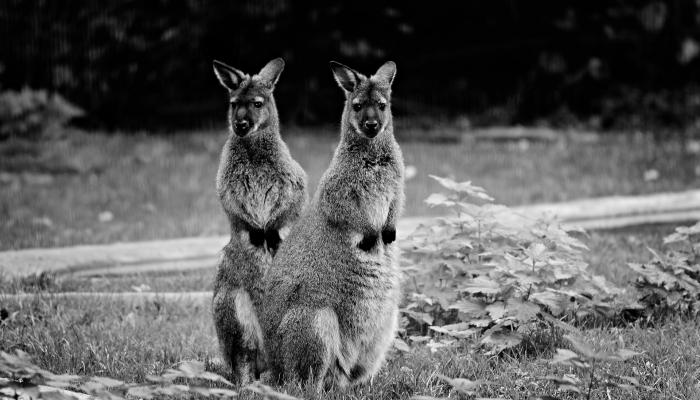Image

29 January 2019
GAIA has launched a new campaign seeking to end the sale of kangaroo meat in Belgium. “Kangaroo meat is synonymous with animal abuse”, says Michel Vandenbosch, president of GAIA. “It has no place on our supermarket shelves."
Each year, about 1.6 million kangaroos are hunted and killed in particularly cruel conditions. This statistic makes the kangaroo the most hunted wild animal in the world. Unfortunately, Belgium is partly responsible for maintaining this commercial hunt, as it is the world's largest importer of kangaroo meat for human consumption.
## Imports on a very large scale
In 2016, our country imported more than 632 tons of kangaroo meat, which represents about 180,000 animals. This record number makes us the world's largest importer of kangaroo meat, ahead of Germany and Papua New Guinea. In Australia, the kangaroo has a dual status: on the one hand, that of a "pest" to be exterminated and, on the other hand, that of a lucrative financial resource for the authorities and the meat industry. Along with this negative vision is the extreme cruelty to kangaroos from hunting.
It is not an exaggeration to say that the Australian government actively encourages kangaroo hunting. As justification, it puts forward various arguments, such as "there is kangaroo over-population" or "they cause harm to farmers by damaging pastures." "Scientific studies completely refute these arguments”, declares Michel Vandenbosch. “The authorities carry out population counts, which are strongly criticized for their lack of rigor. However, it is based on these very counts that the annual hunting quotas are determined."
## Organized cruelty
The kangaroo hunt takes place at night, out of sight. Blinded by the powerful headlights of 4x4s, the marsupials are hunted with rifles. In theory, the law stipulates that hunters must normally kill the animals with a shot to the head. In practice, however, misses are inevitable and shots to the body cause the kangaroos terrible suffering. Injured animals sometimes manage to escape and are then sentenced to a long agony.
The cruelty of kangaroo hunting also affects the young animals, known as joeys. It is estimated that between 2000 and 2009, 800,000 very young joeys (still in their mother's pouch) and 300,000 older ones (able to move on their own) were either massacred or abandoned, facing certain death, in the context of commercial hunting each year. When not merely left to their fate, the joeys are killed either by violent blows to the head or by decapitation, for those baby joeys still in the mother’s pouch. These brutal methods of killing are legally permitted.
As the world's largest importer, Belgium is responsible for perpetuating this organized cruelty. "We cannot ignore the terrible reality behind the scenes of this industry", says Michel Vandenbosch. Supermarkets also bear their share of responsibility. GAIA is asking Makro, Carrefour, Match, Spar, Cora and Delhaize to commit to banning kangaroo meat from their shelves – thus following the example of Aldi, Colruyt and Lidl.
In 2016, the supermarket chain ALDI Belgium made a clear commitment to stop selling kangaroo meat in its stores. "The kangaroo hunt, which does not respect animals, has forced us to ban kangaroo meat from the shelves of our stores", says Hans De Bremme, business unit director of Corporate Responsibility of ALDI Belgium. Unfortunately, examples of this type of commitment are still rare, according to GAIA.
After reading our report on Monday, January 28th, Delhaize also committed to stop selling kangaroo meat. "This is a step forward, but other brands continue to maintain this unethical business,” insists the president of GAIA. “We demand that Belgium bans the trade in kangaroo meat, following the model of the ban on products derived from seal hunting."
## Analysis of steaks sold in Belgium
For years, numerous analyses have revealed the presence of E. coli and salmonella in kangaroo meat. In the face of these shocking findings, Russia (formerly the world's largest importer) decided to completely close its borders to all imports of kangaroo meat in 2014. But the industry has nevertheless found a subterfuge: to avoid losing important market shares, the kangaroo meat is routinely cleaned with acetic acid and lactic acid in order to remove traces of these contaminants.
To measure the impact of these practices in Belgium, GAIA had steaks sold at Carrefour and Delhaize analysed. In early January, nine samples were taken for analysis to a laboratory specialized in food analyses. Conclusion: "The results indicate the addition of lactic acid."
In the past, tests in the Netherlands and Germany have already detected use of lactic acid by the industry to treat kangaroo meat. In addition, slaughtering and transporting kangaroos is done without any hygienic measures, and contamination with pathogenic bacteria is inevitable - as has been demonstrated in tests in Australia. For GAIA, the use of lactic acid is therefore obvious.
The problem is that routine use of lactic acid on fresh meat (game) is not allowed in the European Union, which necessarily makes this practice illegal. Following a request from Australia, the European Commission asked EFSA (the European Food Safety Agency) for a scientific opinion on the efficacy and danger of the use of lactic acid on kangaroo meat. "Although the results are not yet known, kangaroo meat continues to flood the European market", says Michel Vandenbosch.
At the website www.viandedekangourou.be, GAIA invites citizens to sign a petition calling for a ban on the trade of kangaroo meat in Belgium.